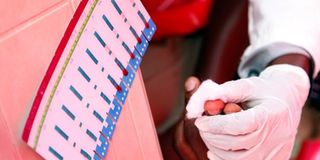Fake malaria test kits flood market

The test. A lab attendant takes a blood sample from a patient for a malaria test. PHOTO | FILE
What you need to know:
- The report also shows that some health workers have lost confidence in using the test kits, with some of them giving drugs to persons who test negative of malaria after using an RDT.
- The test, treat and track campaign was launched by the World Health Organisation to scale up diagnostic testing, treatment and surveillance for malaria, the disease being a single biggest cause of illness and death in the country.
KAMPALA: Members of Civil Society Organisations (CSOs) and a section of officials at the Ministry of Health have expressed concern over the fake malaria testing kits that are flooding the Ugandan market.
The Rapid Diagnostic Test (RDT) kits introduced in December 2012 by the Ministry of Health are used to confirm every suspected malaria case before being enrolled onto treatment using artemisinin-based combination therapy (ACT).
However, a study conducted by the Coalition for Health Promotion and Social Development (HEPS-Uganda), has indicated that RDT kits imported by the private sector outside the National Drug Authority (NDA) procedure are of poor quality.
“There is no quality assurance for RDTs imported by the private sector outside the NDA procedures and their quality cannot be guaranteed,” indicated a report presented by Mr Denis Kibira, the HEPs-Uganda executive director at an advocacy and stakeholders meeting in Kampala on Thursday.
Complaints
Mr Micheal Nandala, a quality assurance coordinator attached to Central Public Health Laboratories (CPHL), said they have received some complaints that there are poor quality kits being sold on the market.
“We participate in the scrutiny of RDTs which have been an issue but I think we need a complete quality assessment programme to repeat some positive-test using a microscope,” Mr Nandala observed.
Mr Frank Kaleebu, who spoke on behalf of the director inspectorate at NDA, blamed the fake testing kits flooding the market on absence of a legislation that empowers the drugs’ body to inspect medical devices. He, however, added that a new law, which is in the offing, will help to crack down of fake medical devices such as RDTs.
Dr Jimmy Opigo, the head of National Malaria Control Programme (UMCP) at the Ministry of Health, said there is need to regulate all malaria supplies to avoid fake devices, including mosquito nets.
Dr Opigo also noted that World Malaria Day will be marked on April 25 under the global theme: “Defeat malaria for good” whereas that of Uganda is “children up against malaria.”
The report
How they get here. The report indicated that the National Drug Authority requires prospective importers of pharmaceuticals and medical devices to be certified by the product manufacturers as local technical representatives. However, small importers circumvent this procedure and import the Rapid Diagnostic Test (RDT) kits as general merchandise.
Dangers. The report also shows that some health workers have lost confidence in using the test kits, with some of them giving drugs to persons who test negative of malaria after using an RDT.
“There is need to make quality diagnostics cheap since self-medication is affecting the treatment of malaria,” Mr Denis Kibira, the HEPs-Uganda executive director, observes.
The campaign. The test, treat and track campaign was launched by the World Health Organisation to scale up diagnostic testing, treatment and surveillance for malaria, the disease being a single biggest cause of illness and death in the country.



